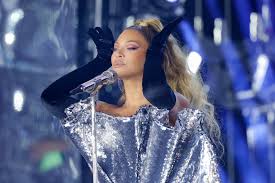When Beyoncé sets a course for her next move, the world listens. Few artists in the modern era have managed to maintain the kind of mystery, creative control, and sheer cultural gravity that Beyoncé Knowles-Carter commands with each release. After conquering dance, house, and electronic music with Renaissance in 2022, then pivoting to country with 2024’s Cowboy Carter, the superstar has left her devoted BeyHive buzzing with questions: What will Act III sound like, when will it arrive, and how will Beyoncé redefine music history this time around?
For Beyoncé, this moment is unlike any other in her three-decade career. She’s not just building hype for a new record — she’s closing the book on what she herself has called a three-act project. Each act has unfolded with precision, artistry, and careful timing. If Renaissance was a shimmering celebration of queer ballroom culture and house music, and Cowboy Carter was a radical reclamation of country’s Black roots, then the trilogy’s grand finale has to be nothing short of spectacular.
And if fan theories are correct, that finale may be Beyoncé’s foray into rock.
The story of Beyoncé’s current arc began on July 29, 2022, when she dropped Renaissance, her seventh studio album. True to form, she released it on a Friday — a deliberate choice that would quietly set the rhythm for what came next. The record became an immediate critical and commercial juggernaut, sweeping four Grammy Awards and securing her place in history as the most decorated Grammy winner of all time.
But what really set Renaissance apart was the declaration that it was only the beginning. Beyoncé confirmed the album was “Act I” of a three-part project, planting a seed that would keep fans guessing long after the album cycle ended.
Two years later, on March 29, 2024, Cowboy Carter arrived. Its rollout was understated by Beyoncé standards, but the impact was seismic. Not only did she dive headfirst into country — a genre she had only brushed against in the past — but she also made history. With the “Cowboy Carter and the Rodeo Chitlin’ Circuit Tour,” Beyoncé shattered records, becoming the highest-grossing country music touring act of all time. The 32-stadium U.S. and European run amassed more than $400 million in earnings, cementing her ability to dominate any genre she touches.
If Act I was about reclaiming dance culture, and Act II was about reclaiming country, then Act III — whatever it may be — has the potential to be her boldest statement yet.
The strongest theory among fans is that Beyoncé’s next album will be a rock project. It’s not a baseless rumor; it’s one supported by carefully planted hints and a history of genre experimentation.
One major clue came during Halloween, when Beyoncé paid homage to funk-rock trailblazer Betty Davis, known for her electrifying performances and boundary-pushing style. Fans immediately saw it as a nod to where she might be headed musically.
Then came her Levi’s campaign. In August 2024, Beyoncé unveiled “The Denim Cowboy,” the fourth chapter in her ongoing partnership with Levi’s. The ad began with her perched on horseback, a familiar image after the Cowboy Carter era. But the video ended differently: Beyoncé, clad in a rhinestone-studded denim jacket and jeans, revved up a motorcycle. For fans who analyze every frame of her visuals, the symbolism was impossible to ignore. Cowboy on horseback meant country. Beyoncé on a motorcycle? That screamed rock.
Rock, too, has long been a genre where Black contributions were erased or minimized. From Sister Rosetta Tharpe, often called the godmother of rock ’n’ roll, to the deep influence of blues and funk musicians, the genre’s roots are undeniably Black. If Beyoncé chooses to make rock the centerpiece of Act III, she would once again be reclaiming a sound that has always been tied to her community’s history.
And while she’s never made a full rock album, Beyoncé has dipped her toes into the sound before. Think of her gritty I Am… Sasha Fierce track “Radio,” the guitar-driven “Ring the Alarm,” or even her legendary Super Bowl halftime performance with Coldplay and Bruno Mars, where her presence cut through with rock-star power. A full-fledged rock project would not be a reinvention so much as an evolution of seeds she’s planted over years.

If there’s one thing the BeyHive knows, it’s that a new album means a new tour. Beyoncé’s tours aren’t just concerts; they’re cultural events, meticulously crafted spectacles that blend choreography, storytelling, and fashion with unmatched showmanship.
Following the end of her Cowboy Carter tour, fans were already speculating about the next round of live performances. Then, in a now-famous Instagram post after her London show, Beyoncé added fuel to the fire.
“Thank you, Sir Paul McCartney, for writing one of the best songs ever made,” she wrote, referring to her Cowboy Carter cover of the Beatles classic “Blackbird.” She went on to thank London for “unforgettable memories” before dropping a casual line: “Holla at ‘ya when I come on tour again!”
That single phrase was all it took for the Hive to erupt. Comment sections filled with declarations like, “Oh, it’s confirmed!” and “Tour AGAIN!! Saving my Bey dollars now.”
The London hint also carries symbolic weight. If Act III is truly leaning toward rock, where better to highlight it than the U.K., the birthplace of so many iconic rock movements? From The Beatles to Led Zeppelin to Queen, London stages are hallowed ground for rock history — and Beyoncé knows exactly how to play with cultural touchstones.
Beyoncé’s release strategy is always a game of patterns and surprises. Looking at the timeline between Renaissance and Cowboy Carter, a few theories begin to emerge.
Both albums dropped on the 29th of a month and on a Friday. Renaissance was July 29, 2022, while Cowboy Carter landed on March 29, 2024. If Beyoncé holds to this rhythm, then the next “29th on a Friday” would fall on May 29, 2026 — just over two years after Act II.
But Beyoncé is also a master of disruption. She’s been known to drop projects tied to major cultural moments, from surprise midnight releases to Super Bowl weekends. That means fans could see an announcement much sooner, perhaps around September or October 2025, which would mark about 20 months since Cowboy Carter.
It’s a delicate balance between predictability and surprise, and Beyoncé thrives on keeping both fans and the industry guessing.
What makes Beyoncé’s rollouts so riveting is that she doesn’t play by industry rules — she rewrites them. When she released her self-titled Beyoncé album in 2013 without warning, she changed how the music business thought about surprise drops. When she announced Renaissance two years ago, she did so with minimal press, relying instead on her own platforms to create a direct line to fans.
This level of control is rare in an industry where leaks, corporate demands, and social media pressure often dictate release cycles. For Beyoncé, every image, every lyric, and every Instagram caption is intentional. The Betty Davis costume, the Levi’s motorcycle, the London “tour again” hint — they’re not random. They’re part of a breadcrumb trail designed to fuel speculation while keeping the true vision under wraps.
The anticipation for Act III isn’t just about new music. It’s about what Beyoncé represents: an artist at the peak of her powers, unafraid to dive into new genres and reshape their narratives.
If Act I was about joy and freedom on the dance floor, and Act II was about reclaiming country for its Black pioneers, then Act III could be about reclaiming rock ’n’ roll as an art form rooted in Black creativity. Beyond genre, it will likely be Beyoncé’s thesis statement — the conclusion to a trilogy that spans history, culture, and identity.

Whatever form it takes, fans know to expect the unexpected. Whether it’s a stadium tour announcement, a midnight album drop, or a Super Bowl-sized spectacle, Beyoncé’s next move will once again redefine the rules of pop superstardom.
And for the BeyHive, the waiting is part of the thrill.



